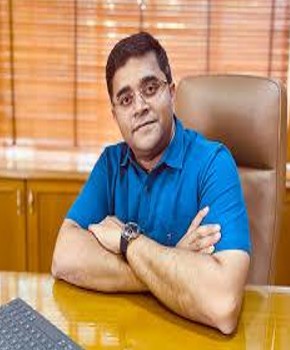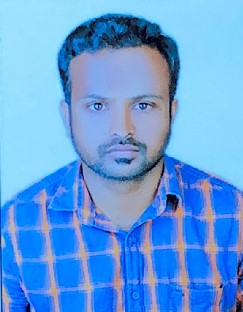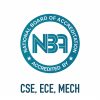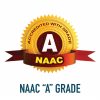Sri Shanmugha Educational Institutions
- ABOUT THE DEPARTMENT
- FACULTY PROFILE
- VISION & MISSION
- PO, PEO & PSO
- CURRICULUM & SYLLABI
- BOS MINUTES
- DEPARTMENT ACADEMIC CALENDAR
- Research & Consultancy
- LIBRARY DETAILS
- LABORATORY FACILITIES
- STUDENT PARTICIPATION
- FACULTY PARTICIPATION
- MOU
- INTERNSHIP & INDUSTRIAL VISIT
- PLACEMENT DETAILS
- PROFESSIONAL SOCIETY
- NEWSLETTER
- MAGAZINE
- E-RESOURCES
- EVENT GALLERY
- TESTIMONIAL

The department of Computer Science and Engineering (Cyber Security) was established in the year 2023 with an intake of 60 and it is emerging for addressing the industry’s increasing demand for skilled security professionals in the public and private sectors.
The Department is dedicated to equipping students with comprehensive expertise in safeguarding digital systems and information assets. At its core, this department delves into foundational cyber security concepts, instilling a deep understanding of cryptography, network security, secure coding practices, digital forensics, ethical hacking, and risk management. These fundamentals serve as the bedrock upon which students build their expertise in tackling modern cyber security challenges.
In addition to technical prowess, the department emphasizes the importance of legal and ethical considerations in cyber security. Students delve into the intricacies of privacy laws, intellectual property rights, compliance standards, and the ethical responsibilities inherent in cyber security roles. This holistic approach ensures that graduates not only possess technical competence but also operate within legal and ethical frameworks. Students explore cutting-edge advancements such as artificial intelligence, blockchain security, IoT security, and cloud security.
Soft skills and communication are also prioritized within the department. Recognizing the collaborative nature of cyber security work, students hone their abilities in communication, teamwork, and project management. These interpersonal skills complement technical expertise, enabling graduates to thrive in multidisciplinary environments.
The Department collaborates closely with industry leaders such as K7 Computing and EC-Council through Memorandums of Understanding (MoUs), enriching the curriculum and providing students with invaluable real-world insights.
Finally, research and innovation serve as pillars of excellence within the department. Students and faculty are encouraged to engage in research projects, publish findings, and collaborate with industry partners to advance cyber security knowledge and practices. This commitment to innovation ensures that graduates are equipped not only to address current cyber security challenges but also to shape the future of the field through continuous learning and discovery.
The Department is adopting a new innovative teaching methodology to meet PEOs (Programme Educational Objectives). It is organising technical activities in tutorial periods for the enhancement of student’s skills. It has organised a short-term course for students on ANDROID which will bridge the gap between Academia and Industry. It is also encouraging students to develop the in-house project so that they can meet the industrial requirements, by adopting the standard Project Development Process. Our department has been recognized by IIT Bombay to act as a nodal center for all its distance digital learning process. It has also been bestowed with virtual classroom facilities. We have signed an MOU with NPTEL for displaying the lectures by the eminent professors of Computer Science and Engineering. The faculties of the department are the members of the Indian Society for Technical Education (ISTE) and Computer Society of India (CSI). The Department of Computer Science and Engineering has the primary objective of providing world-class education in the field of Computer Science. The department is combining excellence in education and research with reference to the industry. Right from its inception, the Department has been offering phenomenal infrastructural facilities with a variety of computing platforms to professional students to meet the burgeoning demands of the IT industry.
 |
1st NBA Accreditation Academic Years 2020-2021 to 2022-2023 (Upto 30.06.2023) |
|
Permanent Affiliation from Anna University Chennai |
|
Faculty List
|
S.No |
Name |
Designation |
|
1. |
Dr.K. Venkatachalam |
Associate Professor |
|
2. |
Mr.A. Thirumoorthy |
Assistant Professor |
|
3. |
Mr.N. Prabu |
Assistant Professor |
| Dr.K. Venkatachalam |  |
|
| Designation | Associate Professor | |
| Contact No | 9790328342 | |
| Venkatachalam.k @shanmugha.edu.in | ||
| Qualification | M.E., Ph.D., | |
| Specialization | Computer Science and Engineering | |
| Experience (in years) | ||
| Teaching | 15 Years | |
| Industry | – | |
| About Me | ||
| Dr. K. Venkatachalam received his Bachelor’s in Information Technology in 2005, a Master’s in Computer Science and Engineering in 2008, and Ph.D. in Computer Science and Engineering in 2018. He has more than 14 years of academic experience. He has published over 50 scientific papers in high-quality journals and international conferences in these areas. He has published several articles in peer-reviewed journals, and his research interest includes Data Mining, Web services, semantic web services, Distributed computing, and Cloud Computing. He is a Sun Certified SCJP professional with BrainBench certification in various disciplines. He has organized several workshops on J2ME, Advanced Java Programming, Web Services, Enterprise Computing, Web Technology, and WSN (wireless sensor network) in his Institution. He has delivered more than 20 Guest Lectures in reputed engineering colleges on various topics. | ||
| Mr.A. THIRUMOORTHY |  |
|
| Designation | Assistant Professor | |
| Contact No | +91 – 8838960787 | |
| Thirumoorthy.a@shanmugha.edu.in | ||
| Qualification | M.E., | |
| Specialization | Computer Science and Engineering | |
| Experience (in years) | ||
| Teaching | 1 Year | |
| Industry | 20 Years | |
| About Me | ||
| Mr.A Thirumoorthy received his Bachelor Degree B.E.(CSE) degree in 2001 from Madurai Kamaraj University. He completed his master degree M.E (CSE) in 2023 at Anna University, Chennai. He has 20 years of Industry experience and 1 year of teaching experience. He is passionate about nurturing the next generation of entrepreneurs and creating a robust talent pool for students and professionals alike. His mission is to revolutionize the learning experience and skill development, shifting from traditional curriculum-based education to a skillset-oriented approach, empowering individuals to be self-driven and industry-ready. As the visionary behind Aakam360, He bridges the gap between education and industry, facilitating early industry exposure for students, harnessing educational infrastructure to nurture budding entrepreneurs, and fostering enriching research and niche technologies. His goal is to continue nurturing today’s youth, educators, and professionals to become innovative, skilled, and leaders of tomorrow. |
||
| Mr.N. PRABU |  |
|
| Designation | Assistant Professor | |
| Contact No | 9910978714 | |
| Prabu.n@shanmugha.edu.in | ||
| Qualification | M.E., | |
| Specialization | Computer Science and Engineering | |
| Experience (in years) | ||
| Teaching | 7 Years | |
| Industry | Nil | |
| About Me | ||
| Mr.N.Prabu received B.E.(Computer Science and Engineering) degree in 2011 from Anna University, Tiruchirappalli. He completed his master degree M.E (Computer Science and Engineering) in 2015 at Vinayaka Missions University, Sale, Tamilnadu. He has 7 years of teaching experience. | ||
Vision
To craft professionals who possess specialized expertise in cyber security, equipped for global career opportunities, entrepreneurial ventures, dedicated research pursuits, and mindful of their societal responsibilities.
Mission
M1: To foster adept cyber security engineers through an academic milieu characterized by cutting-edge resources and a curriculum tailored to industry demands.
M2: To deliver innovative technical solutions to address cyber security challenges and threats through collaborative projects with industry partners, societal stakeholders, and professional organizations..
M3: To enhance the department’s prowess by assembling a proficient faculty team dedicated to research in pivotal cyber security domains.
Program Outcomes (POs)
- Engineering knowledge: Apply the knowledge of mathematics, science, engineering fundamentals, and an engineering specialization to the solution of complex engineering problems.
- Problem analysis: Identify, formulate, review research literature, and analyze complex engineering problems reaching substantiated conclusions using first principles of mathematics, natural sciences, and engineering sciences.
- Design/development of solutions: Design solutions for complex engineering problems and design system components or processes that meet the specified needs with appropriate consideration for the public health and safety, and the cultural, societal, and environmental considerations.
- Conduct investigations of complex problems: Use research-based knowledge and research methods including design of experiments, analysis and interpretation of data, and synthesis of the information to provide valid conclusions.
- Modern tool usage: Create, select, and apply appropriate techniques, resources, and modern engineering and IT tools including prediction and modeling to complex engineering activities with an understanding of the limitations.
- The engineer and society: Apply reasoning informed by the contextual knowledge to assess societal, health, safety, legal and cultural issues and the consequent responsibilities relevant to the professional engineering practice.
- Environment and sustainability: Understand the impact of the professional engineering solutions in societal and environmental contexts, and demonstrate the knowledge of, and need for sustainable development.
- Ethics: Apply ethical principles and commit to professional ethics and responsibilities and norms of the engineering practice.
- Individual and team work: Function effectively as an individual, and as a member or leader in diverse teams, and in multidisciplinary settings.
- Communication: Communicate effectively on complex engineering activities with the engineering community and with society at large, such as, being able to comprehend and write effective reports and design documentation, make effective presentations, and give and receive clear instructions.
- Project management and finance: Demonstrate knowledge and understanding of the engineering and management principles and apply these to one’s own work, as a member and leader in a team, to manage projects and in multidisciplinary environments.
- Life-long learning: Recognize the need for, and have the preparation and ability to engage in independent and life-long learning in the broadest context of technological change.




